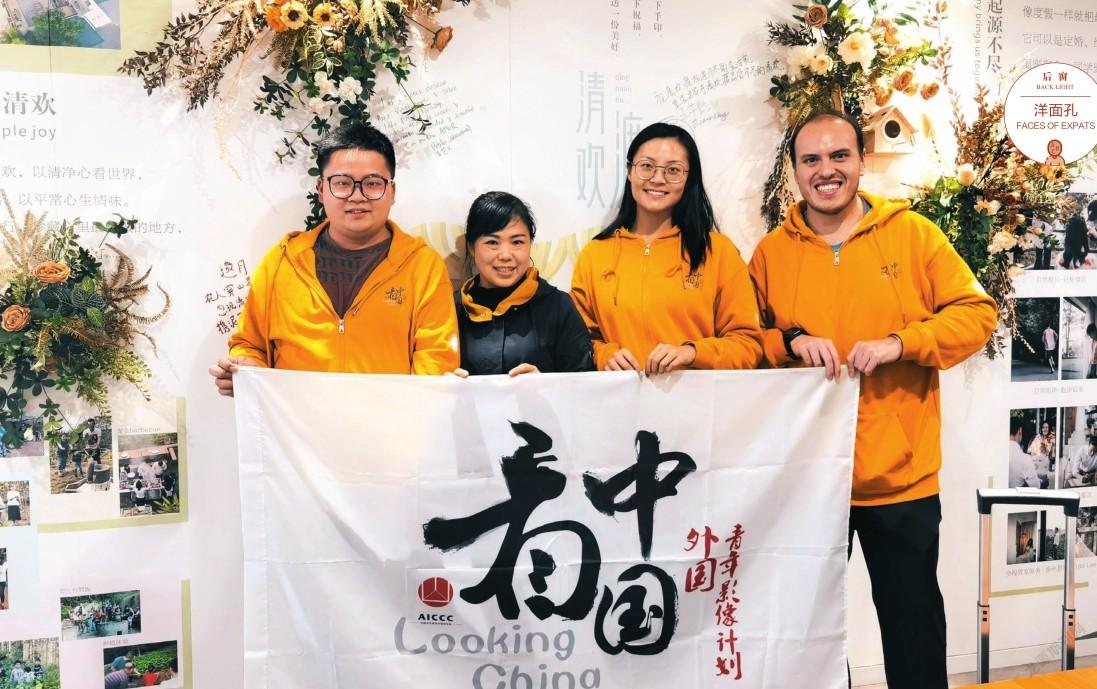听阿根廷小伙论“道”
2021-09-10高维微
高维微

在北碚白居易老茶館见到Pablo时,他正和朋友们一起品茶。
Pablo来自阿根廷,中文名潘楚天,是西南大学的一名外籍教师,在重庆生活了8年。去年10月,潘楚天和西南大学学生王芊懿共同完成的微电影《渡娘道》,是“2020看中国·外国青年影像计划·重庆行”活动的10部优秀纪录片之一。
《渡娘道》取材于真实故事,讲述的是普通农村妇女孙德红成长为高档民宿“清欢渡”老板娘的经历。
孙德红早年以卖豆花为生,经过多年打拼,在缙云山开办了属于自己的农家乐。在当地政府“建设美丽乡村”的倡议下,她将传统农家乐转型为高档民宿“清欢渡”,还积极带动周边村民致富。
片名中的“渡娘”,指的自然是清欢渡老板娘孙德红。但是“道”又从何而来呢?
对这个问题,潘楚天这位老外竟讲得头头是“道”:“这个字很中国,意义也很复杂。我所理解的‘道’有两层意思,一个是‘路’。另外,我觉得这个字和中国传统文化中的‘阴阳’有关,充满了哲理。”
潘楚天撸起袖子让我们看他的手镯。这是潘楚天来中国前母亲送他的礼物,刻了很多太极图案:“阴与阳,好与坏不断转换,形成一个完整的圆的状态,这是我心中‘道’的意思,也是我母亲理解的中国文化。”
“道,可以简单理解为渡娘的成长之路。和渡娘一样,中国还有很多农村妇女,通过自己的勤劳和奋斗,把日子过得越来越好。”在电影里,潘楚天试图用自己对“阴阳”的理解来解释中国农村妇女的成长之“道”,“阴与阳,一直贯穿在电影的每个环节。”
潘楚天一边播放电影,一边解读——
刚嫁到缙云山时,渡娘一家生活困顿,她进城务工当服务员,那种艰难的生活处境是“阴”。同时,渡娘夫妻俩又很恩爱,他们相互扶持着赚钱养家,这种快乐是“阳”。
再到后来,渡娘开起了农家乐,每天迎来送往,渡娘疲惫的生活状态是“阴”。同时,夫妻俩兢兢业业经营农家乐,客人们赞不绝口,表现的就是“阳”。
农家乐改民宿后,四十来间客房只剩十三间,周边的环境越来越好,渡娘也有更多时间享受乡村生活。潘楚天觉得从这时开始,渡娘的生活已经充满了“阳”。
不管他的解说有没有道理,反正看过《渡娘道》后,孙德红笑得合不拢嘴。每当有人问她为啥要把农家乐改成民宿时,渡娘总会推荐这部《渡娘道》,“我所有心里话,都记录在这部电影里了。”
潘楚天拍摄《渡娘道》并非心血来潮。
五年前,为了一碗豆腐脑,潘楚天在朋友的带领下,来到了孙德红的农家乐,就此与渡娘相识,见证了渡娘和她的清欢渡的成长。潘楚天的家乡罗萨里奥市,位于潘帕斯草原的中心,那里是重要的大豆产区。不过,来中国前,潘楚天没见过豆腐。在重庆生活了8年,潘楚天爱上了各类豆制品,比如豆腐脑、豆花、麻婆豆腐、红烧豆腐、豆腐干等。
“如果没有豆腐,我和我女朋友也不可能在一起。”潘楚天说,他习惯吃牛肉,而女朋友是个素食主义者,还好他们之间有豆腐可以一同享用。
When I met Pablo at Bai Juyi Teahouse in Beibei, he was sipping tea with his friends.
Coming from Argentina and currently serving as a foreign teacher at Southwest University, Pablo got himself a Chinese name--Pan Chutian, and he has lived in Chongqing for 8 years. Last October, the micro-film "Tao in the Eyes of Duniang" jointly created by Pan Chutian and Wang Qianyi, a student of Southwest University, was rated as one of the 10 top documentaries in the "2020 Looking China·Youth Film Project·Chongqing" event.
"Tao in the Eyes of Duniang" is based on the true story of Sun Dehong, an ordinary rural woman, who grew up to be the proprietress of Qinghuandu, a high-end homestay.
Sun Dehong made a living selling tofu pudding in her early years and opened her own farmhouse in Jinyun Mountain after years of hard work. To respond to the call of the local government to "build beautiful countryside", she transformed her traditional farmhouse into a high-end homestay named "Qinghuandu", helping her neighbors to become rich.
The "Duniang" in the title refers of course to Sun Dehong, owner of Qinghuandu. But where does "Tao" come from
On this issue, what Pan Chutian said as a foreigner, actually hit the nail on the head: "This word is quite of Chinese style, with complicated meaning. As far as I’m concerned, "Tao" has two meanings, one is "road". And the other, I think, is related to "Yin and Yang" in Chinese traditional culture, full of philosophy. "
Pan Chutian rolled up his sleeves and showed us his bracelet. This is a gift from his mother before he came to China, engraved with many Tai Chi patterns. "Yin and Yang, good and bad are constantly changing to form a complete round. This is the meaning of ’Tao’ in my eyes and the Chinese culture my mother perceives." said Pan Chutian.
"Tao can be simply read as Duniang’s path of growth. Like Duniang, there are plenty of rural women in China who get better off through their hard work. "In the movie, Pan Chutian tried to explain the growth of Chinese rural women with his own understanding of "Tao" and "Yin & Yang". " ’Yin and Yang’ have been running through this movie,"
interpreted Pan Chutian while playing the movie.
When she first married her husband who lived in Jinyun Mountain, they could barely make ends meet and she had to work as a waitress in big cities. That difficult time was a sign of ’Yin". However, they are an affectionate couple. They support each other to earn money and support their family. Such happiness was a sign of "Yang".
Afterwards, Duniang opened a farmhouse, welcoming visitors and seeing them off every day. Duniang’s tiredness was "Yin". Meanwhile, the couple worked hard to operate the farmhouse, winning praise from guests, which was a sign of "Yang".
After the farmhouse with 40-odd rooms was changed into a homestay, with only 13 rooms left, the surrounding environment got better and better, and Duniang also had more time to enjoy rural life. Pan Chutian believed that from then on, Duniang’s life was full of"Yang".
Whether his explanation makes sense or not, Sun Dehong was grinning from ear to ear watching the short video made about her. Every time asked about why she turned the farmhouse into a homestay, Duniang would recommend the"Tao in the Eyes of Duniang", saying "all my innermost thoughts and feelings are recorded in this movie."
Pan Chutian’s shooting of "Tao in the Eyes of Duniang" was not a whim.
Five years ago, Pan Chutian was led by his friends to Sun Dehong’s farmhouse for a bowl of tofu pudding. There, he met Duniang and witnessed the growth of Duniang and her Qinghuandu. Pan Chutian’s hometown Rosario is located in the center of Pampas grassland, which is a major soybean producing area. However, Pan Chutian had never seen tofu before coming to China. After living in Chongqing for 8 years, Pan Chutian fell in love with all kinds of bean products, such as jellied bean curd, tofu pudding, Mapo tofu, braised tofu, dried tofu, etc.
"Without tofu, my girlfriend and I could not be together," said Pan Chutian, who is a keen lover of beef, while his girlfriend is a vegetarian. Fortunately, they have tofu to enjoy together.
